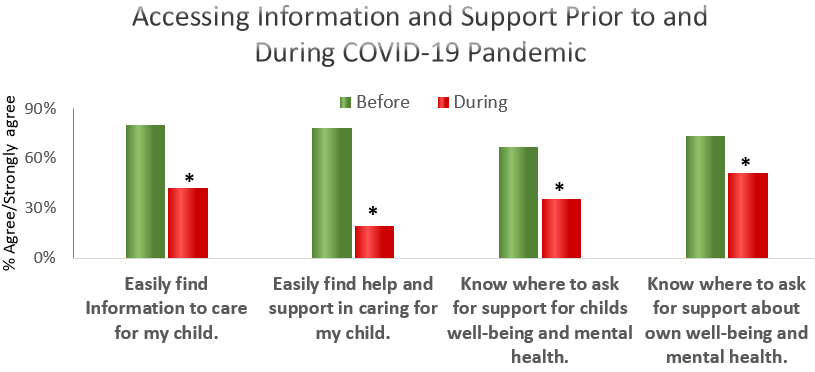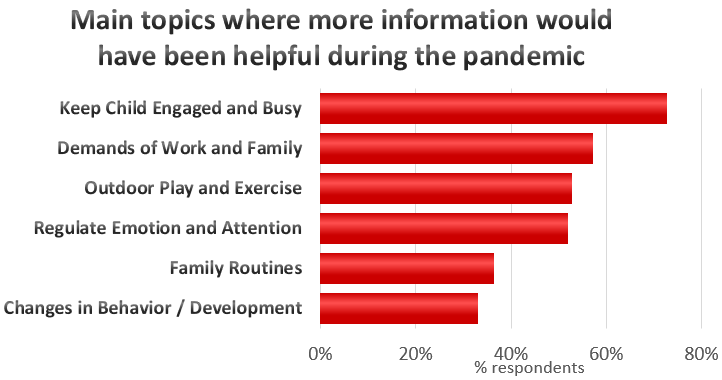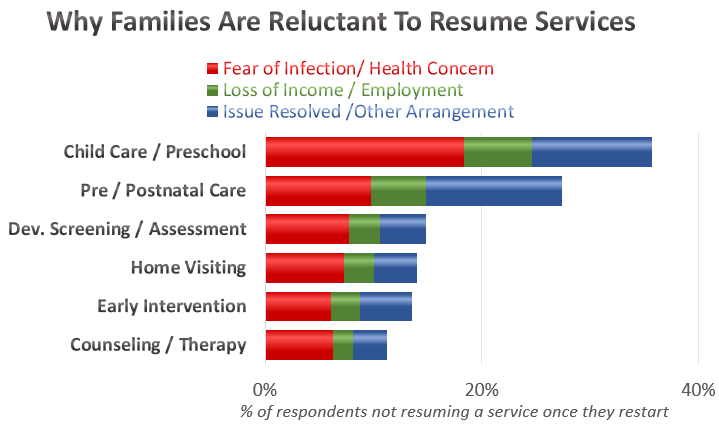Survey highlights challenges of caring for infants and toddlers during the COVID-19 pandemic
Summary:
A survey of over 2,000 families across Canada revealed struggles to find information and support in caring for their young children during the COVID-19 pandemic.

As the first few years of life are essential in laying the foundation for good physical and socio-emotional health, experts in early childhood mental health set out to assess how public health measures put in place during the first COVID-19 lockdown impacted families with young children.
Last fall, a national survey co-led by the Infant and Early Mental Health Promotion (IEMHP) group at The Hospital for Sick Children (SickKids), in partnership with the Ontario Centre of Excellence for Child and Youth Mental Health, Kids Brain Health Network, Children First in Essex County and Queen’s University, revealed that families faced significant challenges in caring for infants and toddlers during the COVID-19 pandemic.
Data was collected through an online survey answered by more than 2,000 families from across Canada and has not been peer-reviewed. Overall, the responses indicated that many families grappled with increased expectations of working while caring for their children, a lack of information and support, unanswered questions on child development and a reluctance to resume services such as child care and preschool.
Disruptions from the pandemic resulted in significant impacts to supports for the physical and emotional development of infants and toddlers
“During the first lockdown, families with children under the age of six were among the first to experience disruptions in services and resources, leaving them in vulnerable situations. Our survey found that with reduced supports readily available to families, there was an increase in caregiver stress and anxiety leading to infant distress during a period where the baby’s brain needs responsive, kind and reassuring relationships,” says Dr. Chaya Kulkarni, Director, IEMHP at SickKids.
Extensive scientific evidence shows that the impact of early stress on infants and children can be felt even into adulthood. While most services and resources for families with infants and toddlers have been impacted by COVID-19 health and safety measures, the IEMHP group highlights the need for these resources to remain intact and accessible in a way that is safe. More than 75 per cent of respondents identified at least three areas where more information would have helped them better cope with the disruptions caused by the pandemic, including how to keep their child engaged, how to manage the demands of work, how to engage in outdoor play and more.
Supporting the mental health of children and their families throughout the pandemic
In addition to concerns about their child’s mental health, caregivers also reported being worried about how their own mental health issues might be affecting their child’s development. Despite these concerns, about 30 per cent of respondents indicated that they did not intend to resume crucial services once available – partly due to difficulties in making informed decisions about COVID-19 risks versus the benefits of those services.
“It has been said that children are the unheard voices of the pandemic, and these responses indicate that the youngest voices in our society will likely face long-term impacts as a consequence of the reduction of supports for parents of infants and toddlers during this time. Our hope is that this survey brings broad awareness to the issue and leads to conversations about increasing and enhancing supports available to these families, particularly as the pandemic continues,” adds Kulkarni.
Survey results: Caring for Infants, Toddlers and Preschoolers During COVID-19
Over 2,000 families across Canada shared their struggles
Increased expectations and lack of information and support
Results from a national survey that asked caregivers about the impact of COVID-19 revealed that families struggled with finding information and support to care for their young children during the pandemic, and frequently had to cope with unrealistic expectations of working and providing care for their children while their formal and informal supports were no longer accessible. In many instances, the absence of these supports was a major source of stress for families of very young children.

- “I found the lack of daycare while working from home full time was not sustainable for my health and well-being.”
- “It is challenging and unrealistic to ask a parent to choose to work, care for a child, educate them and care for them all at the same time.”
- “The effect of loss of childcare options is affecting my psychological wellness and the financial stability of our future, as I am now unable to go to work.”
Unanswered concerns for child development
Over 75 per cent of respondents identified at least three topic areas where more information would have helped them better cope with the disruptions caused by the pandemic. In addition, many caregivers expressed deep concern about their young child’s development and well-being and the lack of information about long-term consequences. Moreover, many caregivers reported being worried about how their own mental health issues might be affecting their child’s development.

- “My biggest concerns are the detrimental developmental implications that my child will experience due to a lack of interaction with other children in a “normal” and frequent enough manner; I worry that this will also impact their mental health.”
- “The lack of resources and consideration for young children and their caregivers has been extremely difficult for both, and I worry the impact will be felt long after the pandemic ends.”
- “Already-lengthy wait times for assessments and therapy have been exacerbated by the demands of the pandemic - and, while understandable, this still makes it very difficult to effectively assess, address, and fulfil my children’s needs, especially when those needs are atypical.”
Reluctance to resume services
At least 30 per cent of respondents indicated that they do not intend to resume crucial services for their young child’s development and mental health once these services resume. Among these families, many report difficulties making an informed decision because of the lack of targeted information about COVID-19 risks versus the benefits of the service. Indeed, close to 20 per cent of respondents felt that they would not resume childcare services because of risk of infection. Of particular concern, many pregnant families indicated that they intend to stay away from pre/post-natal care for the same reasons.

- “There is minimal information outlining impacts the virus has on this age group. We’re stuck between the threshold of what is safe enough for my child to explore and play with, and be exposed to, and when to refrain from certain play, locations etc.”
- “I just need more support for my child’s care (I have family support, but we’re all burnt out at this point), and there aren’t any options that don’t involve a significant risk of infection.”
- “I have found balancing work and childcare very hard and wish that my work was more flexible. Also feel very nervous now that things
are opened up and I feel ‘forced’ to send my child back into care because my work wants more of my time.”
A collaborative initiative of: Infant Mental Health Promotion, Ontario Centre of Excellence for Child & Youth Mental Health, Kids Brain Health Network, Children's First, Queen's University.

AboutKidsHealth COVID-19 Learning Hub
Developed by SickKids experts, this learning hub includes parent and caregiver resources on COVID-19 and how to support your child's mental health and general wellbeing. Topics include COVID-19 and immunocompromised kids, talking to your child about COVID-19, coping with stress and much more.

